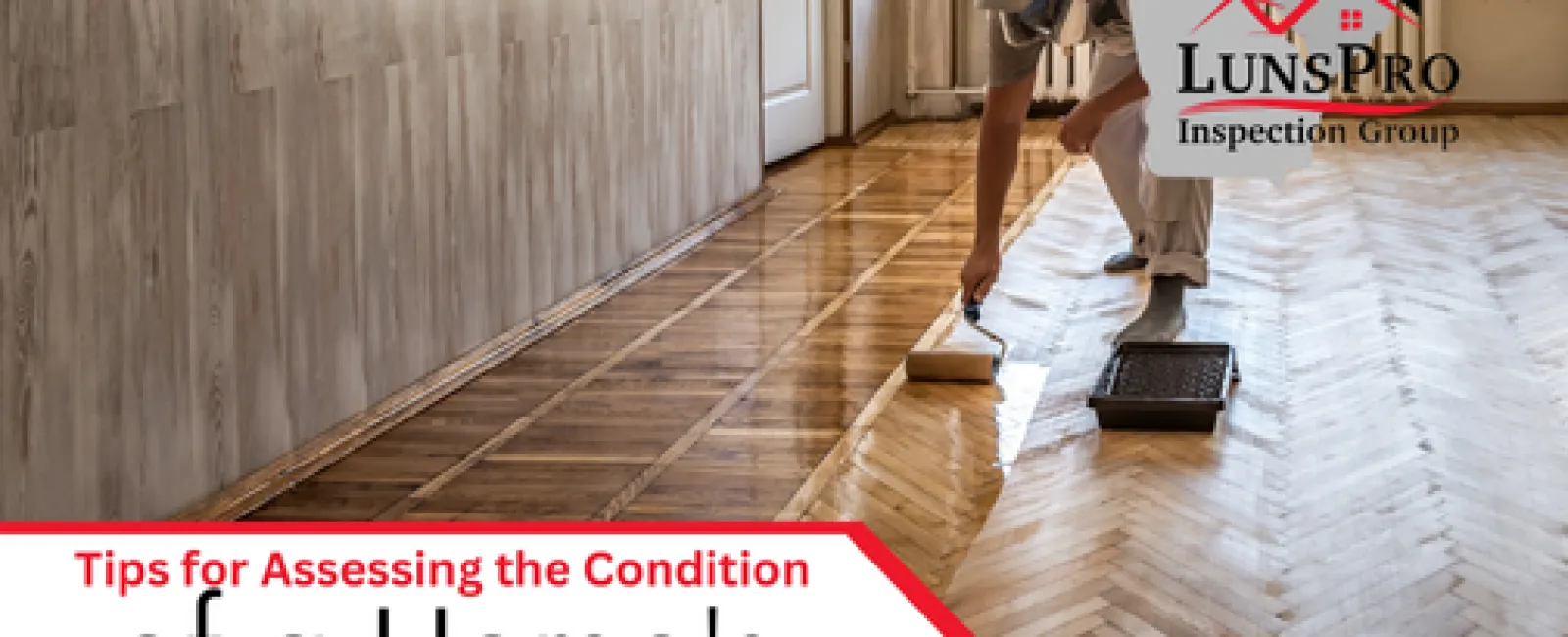When assessing the value and integrity of a home, one area that often gets overlooked is the flooring. However, flooring plays an integral role in the overall comfort, safety, and functionality of a house. Problems with the floor can not only detract from the aesthetics but also serve as indicators of more significant issues like moisture problems, structural weaknesses, or even pest damage. In this article, we will explore detailed tips for assessing the condition of a home's flooring, whether you're preparing to sell, buy, or simply maintain your property.
Flooring is an essential component of any home, yet it's also one of the most susceptible to wear and damage over time. Issues such as improper installation, water damage, or even foundation problems can lead to significant flooring concerns. Addressing these issues early on can save homeowners from more expensive repairs down the road. In the Atlanta area, where homes experience a variety of weather conditions and environmental challenges, flooring assessments are critical.
At LunsPro Inspection Group, we offer comprehensive Atlanta residential and commercial home inspections that include flooring evaluations. Our goal is to help homeowners and property buyers alike make informed decisions by identifying potential problems before they become costly repairs. Whether you are concerned about moisture, structural issues, or other Atlanta home maintenance needs, the tips outlined in this article will help guide you through the process of evaluating your home's flooring.
Importance of a Professional Flooring Inspection
Flooring is an often-neglected aspect of home inspections, but it shouldn't be. Different types of flooring have different potential issues, all of which can affect the safety and longevity of your home. Hardwood floors, tile, carpet, and laminate each present unique challenges, and knowing how to spot early signs of trouble can help you avoid costly repairs.
For example, homes in Atlanta often experience high humidity levels, which can wreak havoc on hardwood floors. Warping and buckling can occur due to prolonged exposure to moisture, while improper installation can lead to gaps and uneven surfaces. If left unaddressed, these problems can create safety hazards and lead to more extensive damage.
When scheduling a home inspection with LunsPro Inspection Group, you can trust that we provide thorough evaluations of all flooring types, helping to ensure that your home's foundation remains solid and your investment protected.
Hardwood Floors
Hardwood floors are prized for their durability and classic beauty, but they are also particularly vulnerable to moisture damage and structural issues. Common signs of hardwood floor problems include warping, gaps between the planks, and an uneven surface. These issues are often a result of moisture infiltration, which can lead to long-term damage if not addressed promptly. Atlanta's humid climate can exacerbate these problems, so it's crucial to inspect hardwood floors regularly, especially in areas prone to moisture such as kitchens, bathrooms, and basements.
When inspecting hardwood flooring, start by looking for visual signs of damage, such as cupping or crowning. Cupping occurs when the edges of the wood planks are higher than the center, typically due to moisture from below. Crowning is the opposite, where the center of the planks rises above the edges, often caused by excess moisture on the surface. Both of these conditions indicate that the flooring may need repair or replacement.
In addition to moisture issues, check for scratches, dents, and signs of wear in high-traffic areas. While minor scratches can often be refinished, deep gouges may require more extensive work. Pay special attention to any squeaky or soft spots in the floor, as these can signal problems with the subflooring or joists, potentially leading to structural damage.
When conducting Atlanta residential and commercial home inspections, LunsPro Inspection Group ensures that hardwood floors are thoroughly inspected for both surface-level and underlying issues. A professional inspection can help identify moisture sources, such as leaks or poor ventilation, which might be contributing to the damage.
Tile and Laminate Flooring
Tile and laminate flooring are popular choices due to their durability and low maintenance, but they still require regular inspections to ensure longevity. Cracked, loose, or uneven tiles can be a sign of foundation shifting, poor installation, or moisture problems. Additionally, damaged grout can allow moisture to seep underneath the tiles, leading to mold and mildew growth—a common home hazard.
During your inspection, carefully examine the tiles for any cracks or chips. While small cracks might seem insignificant, they can worsen over time and lead to larger problems. Loose or hollow-sounding tiles indicate that the adhesive has failed, which can result from poor installation or shifting foundations. In areas where tiles are subject to high levels of moisture—such as bathrooms, kitchens, or laundry rooms—be on the lookout for any signs of mold or mildew.
Laminate flooring is a cost-effective alternative to hardwood but can be highly susceptible to water damage. Swelling or warping is a common issue with laminate flooring, especially if water or moisture seeps into the seams. In humid climates like Atlanta, it's important to inspect laminate flooring in areas exposed to moisture, such as around sinks, dishwashers, or washing machines.
If you're unsure whether damage has occurred under the surface of your tile or laminate floors, Atlanta drone inspections from LunsPro Inspection Group can provide a more comprehensive view of hard-to-reach areas. Drone technology is particularly useful in assessing commercial buildings or expansive properties where traditional inspection methods may not cover all spaces.
Carpeted Floors
Carpeting can hide a multitude of problems, including stains, odors, and even mold or pest infestations. Since carpet fibers can trap moisture and dirt, it's important to lift the edges of the carpet during an inspection to check for any signs of underlying issues.
Start by examining the carpet's overall condition. Look for worn or thinning areas, especially in high-traffic zones. Discoloration or stains can indicate spills or water damage, while odors may point to mold or mildew growth underneath the carpet. In basements or lower levels of homes, carpets are particularly vulnerable to moisture damage. If the carpet feels damp or musty, it's essential to check for water intrusion from leaks or foundation cracks.
In addition to water damage, carpets can conceal pest infestations, such as dust mites or fleas, which can cause allergies or other health problems. For homes with pets, inspect for any signs of pet damage, such as claw marks or odor.
If you suspect mold or moisture problems beneath the carpet, a more detailed inspection, including Atlanta mold and air quality testing from LunsPro Inspection Group, is recommended. Air quality testing can detect hidden mold that may not be immediately visible but poses a significant risk to health and safety.
Signs of Water and Moisture Damage
One of the most common causes of flooring issues is water damage. Whether from leaks, spills, or high humidity levels, water can wreak havoc on all types of flooring. Signs of water damage include warping, discoloration, soft spots, and a musty odor. Water damage is particularly prevalent in Atlanta, where heavy rainfall and humid conditions can create the perfect environment for moisture-related problems.
For hardwood and laminate floors, warping and buckling are clear indicators of moisture damage. In carpeted areas, water damage often leads to mold growth, which can go unnoticed beneath the surface. Tile floors, although more resistant to water, can still suffer from damage if water seeps through damaged grout and into the subfloor.
In cases of suspected water damage, it's essential to conduct a thorough investigation of the home's plumbing system, particularly in bathrooms, kitchens, and laundry rooms. Atlanta septic and sewer scope inspections from LunsPro Inspection Group can help identify potential leaks or blockages that might be contributing to moisture problems in the home.
Subfloor and Structural Concerns
Flooring issues aren't always limited to the surface. Problems with the subfloor or the home's structural integrity can also cause noticeable damage to floors. If a floor feels uneven, soft, or bouncy, it could be a sign of damage to the subfloor or joists. This can occur due to water damage, termite infestations, or general wear and tear over time.
In areas with high humidity or moisture, such as basements or crawl spaces, it's important to check the condition of the subfloor. Damp or rotting subfloors can lead to significant structural issues if not addressed promptly. As part of a comprehensive home inspection, Atlanta home inspectors at LunsPro Inspection Group will assess both the visible flooring and the underlying subfloor to ensure the home's structural integrity is sound.
Properly assessing the condition of a home's flooring is critical to maintaining its value, safety, and longevity. Whether you're purchasing a new home, selling your property, or simply conducting routine Atlanta home maintenance, taking the time to inspect your flooring can prevent costly repairs and ensure the home's overall structural health.
LunsPro Inspection Group offers comprehensive Atlanta residential and commercial home inspections, including thorough flooring evaluations to help identify any potential issues. Whether it's hardwood, tile, carpet, or laminate, we ensure that your flooring is in top condition, or we'll provide guidance on the necessary steps to address any problems.
Don't let flooring problems go unnoticed. With the unpredictable weather patterns and environmental conditions in Atlanta, it's more important than ever to stay on top of home maintenance. Whether you need Atlanta drone inspections, radon testing, mold and air quality testing, or pool inspections, we have the tools and expertise to help you keep your home safe, comfortable, and well-maintained!

